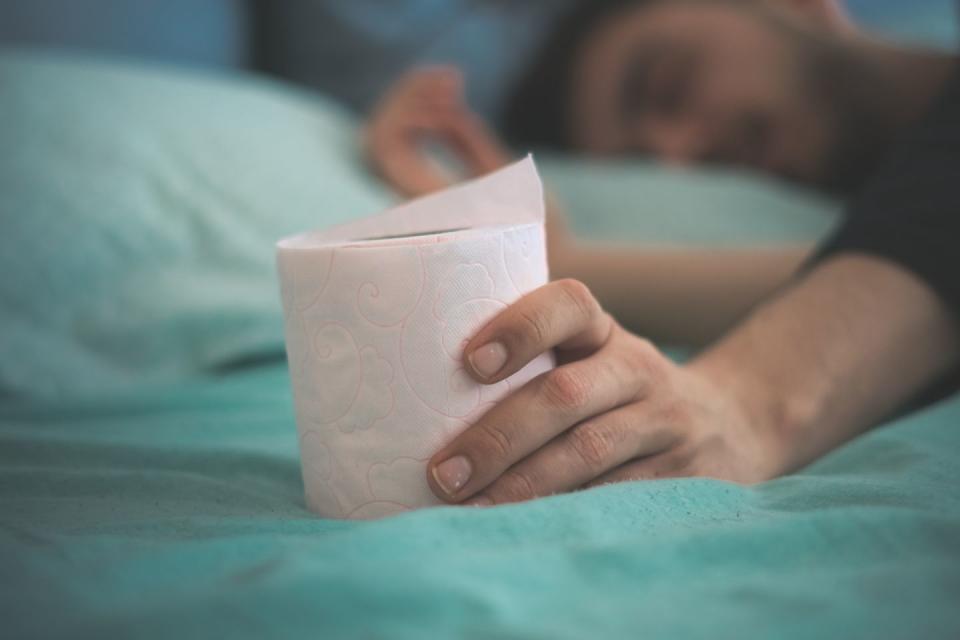Different Ways Your Poop Changes on the Keto Diet
For some people, the low-carb ketogenic diet is a quick way to lose weight. Proponents of the diet argue that going "keto" has benefits beyond dropping a few pounds, such as enhancing energy, fueling exercise performance, and helping build muscle.
But there are side effects to the popular keto diet, too. They include, but are not limited to, the keto “flu,” strange cravings, bad breath, and even an enhance risk of kidney stones.
And then there's the pooping (or lack there of).

While keto-lovers trumpet the fact that you get to eat tons of fat-rich foods like cheese, bacon, and rib eye steaks ... they toot less about how eating tons of fat-rich foods can lead to gastrointestinal issues. And that's especially true if you're moving from a diet that either low- or moderate-fat to a high-fat diet like keto.
Look, any diet change carries with it a risk of throwing off your bowel movements. But keto dieters, in particular, report symptoms that can range in extremes from diarrhea to constipation.
So are these symptoms just part of your body’s natural adjustment to a new (and hard-to-follow) diet? Or are they signals of deeper bodily stress? Depending on the frequency and intensity of what you’re feeling, the answer may be both.
If you're thinking of trying the trendy diet for yourself, you have to ask yourself if this is all worth it to you.
Here’s a breakdown of what you can expect (or are experiencing) from the keto diet and your bathroom troubles.
You will likely be constipated on keto
"Most people right away will get pretty constipated," says Liz Weinandy, R.D. at The Ohio State University.

This is especially true for people who are used to eating plenty of fiber from whole grains and fruits, which are limited on the keto diet. Carbohydrates are typically capped at 30 grams per day, making it hard to enjoy a bowl of oatmeal or an apple.
You could experience diarrhea on keto
Alternatively, some people may have the opposite problem.
Barbie Boules, R.D.N., founder of Nyoutrition, previously told Men's Health this occurs when people don't digest all the fat they're consuming. Plus, many keto-friendly foods contain non-nutritive sweeteners or sugar alcohols, which may cause digestive problems in some people. "Sorbitol in particular is notorious for causing GI upset," she says.
Your poop will probably look different
Stool will have less bulk, due to lack of fiber, and be smaller in size, which isn't exactly ideal. For reference, this would be the Bristol Stool Chart.

"Ideal poop is soft but formed," says Weinandy. "Not too lose and not too solid."
Dr. John Whyte, M.D., MPH and Chief Medical Officer at WebMd says your poop also may be lighter in color due to the high fat content.
Your poop could smell different
Anecdotally, Weinandy says some patients say their bowel movements are more, uh, pungent.
"I have quite a few patients who complain of it smelling worse," she says. That's because eating a lot of high fat foods makes stool move more slowly through the gastrointestinal track.
As a result, stool sits in your system for longer periods of time and can putrefy more easily–particularly if you're eating lots of protein.
You may see blood from hemorrhoids
Again, this is anecdotal, but some of Weinandy's patients develop hemorrhoids from being severely constipated.

Hemorrhoids are swollen veins in the anal canal that become inflamed from straining or sitting on the toilet for extended periods of time, Men's Health previously reported. That's because sitting all that sitting puts strain on the connective tissue that holds the veins in place. People with hemorrhoids may notice some blood when wiping.
So, how do you prevent these awful side effects?
Weinandy recommends drinking plenty of water and taking a fiber supplement like psyllium husk. Many keto dieters rely on magnesium powder or pills to poop, which Whyte advises against.
"I’m not a fan of just taking supplements or minerals without talking to a doctor," he says. "Depending on one's underlying medical condition, they can affect the kidneys or the heart when taken in excess."
Or, you could just give up on being keto–like some of Weinandy's patients.
"It [constipation] could be a make or break deal for some," she says.
You Might Also Like